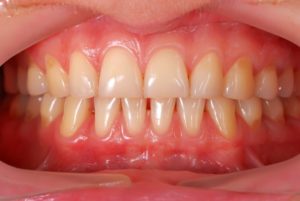 Many people don’t realize that having a systemic disease can cause a dramatic shift in your oral health. With November just around the corner, dentists are getting prepared to educate their patients through a new campaign focusing on National Diabetes Month. If you have diabetes or know someone with the condition, it’s important that they visit.
Many people don’t realize that having a systemic disease can cause a dramatic shift in your oral health. With November just around the corner, dentists are getting prepared to educate their patients through a new campaign focusing on National Diabetes Month. If you have diabetes or know someone with the condition, it’s important that they visit.
To learn how having diabetes can lead to serious oral health complications and what you can do to fight back, take a moment to read this article from a Rock Hill dentist!
Diabetes and Gum Disease
According to a Duke University study, tooth loss overall has dropped, but those with diabetes are still at significant risk. After analyzing data on more than 37,000 individuals examined from 1971 to 2012 from the National Health and Nutrition Examination Survey, researchers found a clear connection between tooth loss and diabetes, especially among African Americans. Those with the condition are at risk of losing twice as many teeth compared to those who do not.
The connection between diabetes and gum disease is directly related to the level of diabetic control a person has. Therefore, those with poor blood sugar control are more likely to develop gum disease. Another complication is the thickening of blood vessels, which are responsible for transporting oxygen and keeping tissue healthy, including gum tissue. If these blood vessels thicken, it slows down this flow of oxygen and nutrients essential to removing harmful waste, therefore weakening the immune system and it’s resistance to gum infections.
Diabetes and Other Oral Problems
While the biggest concern diabetic patients should have is gum disease, it’s not the only reason to make sure it’s being treated properly. Oral thrush, which is a fungal infection that grows in the mouth, is more likely to develop in diabetic patients. This is because the fungus develops more effectively when glucose levels are high.
Furthermore, diabetic patients are more likely to have chronic dry mouth if their condition is untreated. While dry mouth may not seem like a serious condition, it creates a better environment for mouth sores, ulcers, infections and tooth decay.
How Can You Protect Yourself?
Thankfully, preventing gum disease and other dental conditions is simple and straightforward. As long as you take all diabetic medications and practice routine oral care, you can dramatically reduce your risk of gum disease. You can also reduce your risk of tooth loss, which gum disease is the number-one cause of in adults.
On top of keeping good blood glucose control, make sure to:
- Brush twice a day with fluoridated toothpaste for at least two minutes
- Floss daily, making sure to check your teeth afterwards
- Visit the dentist twice a year for cleanings and exams
- Using mouthwash to remove remaining plaque
Need more advice on managing your oral health while living with diabetes? Schedule an appointment today so you can avoid the need for gum disease treatment!
About the Author
Dr. Paul Coombs earned his dental degree from the Medical University of South Carolina. He offers multiple forms of periodontal therapy and works hard to keep patients informed on managing illnesses that affect oral health. To learn more about his practice, you can contact him through his website.

